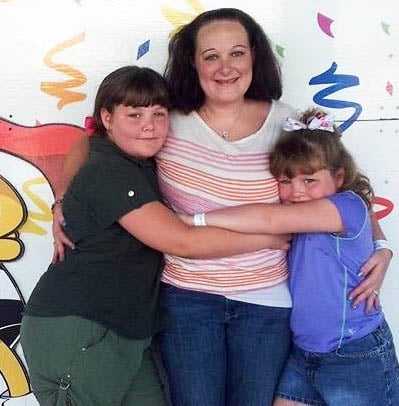Clik here to view.

In the seventh November after his wife and two daughters died in a wildfire, Michael Reed thought he was having a heart attack. “Every November I crash,” he said. “It’s a full meltdown.”
The doctor told Reed that he wasn’t having a heart attack but anxiety from a heart that was broken. He left the hospital, went to the memorial site and talked to his girls.
“I can’t let this kill me every year,” he told them.
Chloe was 12 and Lily 9 when they died in that quick raging 2016 Gatlinburg, Tennessee, wildfire that killed 14. Reed said he senses them tapping on his shoulder, encouraging him through all the therapy, the knives to his wrist, the firey nightmares and questions of when he would “move on,” through all his own questions to God and himself: Is there a purpose to this tragedy?
“I am going to leave here,” he told them that day, “and do the work.”
Clik here to view.

He got online and looked for a college to attend. Grand Canyon University popped up. The first words on the screen: “Find your purpose.”
He picked up the phone. GCU university counselor Lynne Guidos asked if she could help. It was the seventh anniversary of their deaths.
“It was fate we met that morning,” Guidos said. “He felt he needed to start climbing out of that hole. It was a very moving experience for both of us.”
Guidos told Reed that, not long before, she had lost her mom, “who was my person,” and how grief colored everything after that as she ended her marriage and lost her job. But she decided to act, to start a master’s degree at GCU, and the study became her respite, her hiding place and new hope.
“I knew it was meant to be,” Reed said.
Just 18 months later, he is progressing through his GCU undergraduate studies online in behavioral health sciences. It inspired him to make sense of his grief and write the book “The Million Stages of Grief: A Guide to Finding Purpose for Your Pain.” After it was self-published on Amazon in April, it became a bestseller in trauma psychology.
The more he wrote, “the more I could breathe,” Reed said from his Tennessee home.
Many times after the fire, he thought his life was over.
Reed, a maintenance man at Dollywood amusement park, had taken his daughter there for her birthday just days before smoke started drifting over Gatlinburg from the nearby Great Smoky Mountains National Park.
He was down the mountain with teen son Nicholas on Nov. 28, 2016, when he desperately tried to get back to their home off Ski Mountain Road as winds blew the fire rapidly toward their 2,500 square foot home.
His wife’s frantic 911 call ended this way, according to court records: “I have no way out, and I have children at home.”
Their remains were found six days later in a nearby cabin they had retreated to. Reed became a national figure of tragedy as he searched for his missing family over those six days, and a national figure of forgiveness when he took to social media to address the two teens accused of starting the fire.
“We will pray for you. Every day. We will pray for your parents and your family members. Every day. We will pray for your peace. We will show you grace. Why? Because that’s what Jesus would do. … Faith. Hope. Love. The greatest of these is love.”
Nearly nine years later on the phone, he said why he wrote it: “If I don’t forgive, I would turn into a monster. …
Clik here to view.

“But that was the night that I died. I didn’t work. I took my son to school and put a knife to my wrist every day. The only reason I’m here is because of my son. … I called it the darkness. I spent about two years in the darkness.”
Then he began to write. It was the only way he could try to understand grief. In December 2018, he shared his first writing on a Facebook post, how he would wake up hearing the girls’ favorite song, “The Story of My Life” by One Direction, in his head and recall them singing to him at the top of their lungs.
The story of my life. I give her hope. I drive all night, to keep her warm and time is frozen.
“I’d give anything for one more frozen moment in time just to hold them,” Reed wrote.
The response he got from others suffering grief empowered him to keep writing, sharing so deep and raw it hurts to read the pain. He stopped talking to God a long time ago, which he describes in the book, even cursing Him out. He’s continued to pursue an ongoing lawsuit against the Great Smoky Mountains National Park. He still cries every day, and every November the falling leaves trigger immense grief.
But he also described moments of peace, when he kept seeing butterflies, ladybugs and owls. The first he thought of as wife Constance, the ladybug as Chloe and the owl as Lily, for their own reasons.
“I realized over the years it’s not my girls. It’s God coming home,” Reed said. “So in 2023 I let Him back in my heart again and said, ‘You are in control from this point.’”
His GCU studies raged forward as he works as a zipline instructor – ziplining is what his daughter wanted to do that birthday trip to Dollywood, but the ride was closed.
Clik here to view.

He connected with other students and the science of grief. And the searing, emotional journal entries that front the book’s chapters came into focus, each now followed with “the tools and skills that all came from school” and his therapy sessions.
“College has become therapy for me. I have poured a lot of my heart out in those classes.
“It has been life changing to get advice from others and learn from others. And learn why the falling leaves alter my brain. It reassured me I am not crazy.”
GCU’s Guidos has kept in touch through it all and said it’s rewarding to see his growth since their first phone call.
“She has become my inspiration,” Reed said.
He said he can now look at his loss from a therapeutic perspective and use the techniques to heal both himself and, now through his book, others. His purpose.
What he’s learned:
There are not five traditional stages of grief. There are a million. And, no, there is no deadline to grief, you don’t “move on” but learn to accept. It’s OK to cry, ask for help, even live in the darkness for a bit as long as you don’t stay. There is a purpose to it all.
“Grief is a sign of love,” he said. “Grief isn’t a bad thing, it’s a reminder of love for those people.”
He ended the book with the words he and Constance said at their wedding and the words in his letter of forgiveness – the three that quantify what he lost and biblically shares is faith, hope and love.
The greatest of these is love.
Grand Canyon University senior writer Mike Kilen can be reached at mike.kilen@gcu.edu
***
Related content:
GCU News: She couldn't afford to go to commencement, until a rich surprise unfolded
GCU News: Doctoral candidate honored for helping victims of crime
The post A grief observed in student's book on death of wife, daughters appeared first on GCU News.